- Home
- Media Kit
- MediaJet
- Current Issue
- Past Issues
- Ad Specs-Submission
- Ad Print Settings
- Reprints (PDF)
- Photo Specifications (PDF)
- Contact Us
![]()
ONLINE
![]()
ONLINE

Dream Big - Raise Health
Editors’ Note
Michael Dowling is one of healthcare’s most influential voices, taking a stand on societal issues such as gun violence and immigration that many health system CEOs shy away from. His leadership has been invaluable to Northwell’s consistent expansion and prominence. In March 2020, he successfully navigated the health system through the first COVID-19 epicenter in the U.S., detailing Northwell’s experiences in a book entitled, Leading Through a Pandemic: The Inside Story of Humanity, Innovation, and Lessons Learned During the COVID-19 Crisis. Overall, Northwell has treated over 300,000 COVID patients – more than any other U.S. health system.
Prior to becoming CEO in 2002 and joining Northwell in 1995, Dowling served in New York State government for 12 years, including seven years as State Director of Health, Education, and Human Services and Deputy Secretary to the Governor. He was also Commissioner of the State Department of Social Services. Earlier, he was a Professor of Social Policy and Assistant Dean at the Fordham University Graduate School of Social Services and Director of the Fordham campus in Westchester County. Dowling has been honored with many awards and recognitions over the years, including the Ellis Island Medal of Honor, the Presidential Distinguished Service Award for the Irish Abroad, the Alfred E. Smith Award from the American Society for Public Administration, the National Human Relations Award from the American Jewish Committee, and the Foreign Policy Association Medal award. In 2017, he was selected to serve as the Grand Marshal of New York’s St. Patrick’s Day Parade. For 15 years, Modern Healthcare has ranked Dowling on its annual list of the “100 Most Powerful People in Healthcare.”
Dowling is past Chair of the Healthcare Institute and the current Chair of the Institute for Healthcare Improvement (IHI). He is a member of the Institute of Medicine of the National Academies of Sciences and the North American Board of the Smurfit School of Business at University College, Dublin, Ireland. He also serves as a board member of the Long Island Association. He is past chair and a current board member of the National Center for Healthcare Leadership (NCHL), the Greater New York Hospital Association, the Healthcare Association of New York State, and the League of Voluntary Hospitals of New York. Dowling was an instructor at the Center for Continuing Professional Education at the Harvard School of Public Health. He earned his undergraduate degree from University College Cork (UCC), Ireland, and his master’s degree from Fordham University. He also has honorary doctorates from the prestigious Queen’s University Belfast, University College Dublin, Hofstra University, Dowling College, and Fordham University.
Institution Brief
Northwell Health (northwell.edu) is a clinical, academic and research enterprise with a workforce of more than 80,000 and annual revenue of $15 billion. Northwell is the largest healthcare provider and private employer in New York State, caring for more than two million people annually through a vast network of more than 850 outpatient facilities, including 220 primary care practices, 52 urgent care centers, home care, rehabilitation, and end-of-life programs, and 21 hospitals. Northwell also pursues pioneering research at the Feinstein Institutes for Medical Research and a visionary approach to medical education highlighted by the Zucker School of Medicine, the Hofstra Northwell School of Nursing and Physician Assistant Studies, and one of the nation’s largest medical residency and fellowship programs.
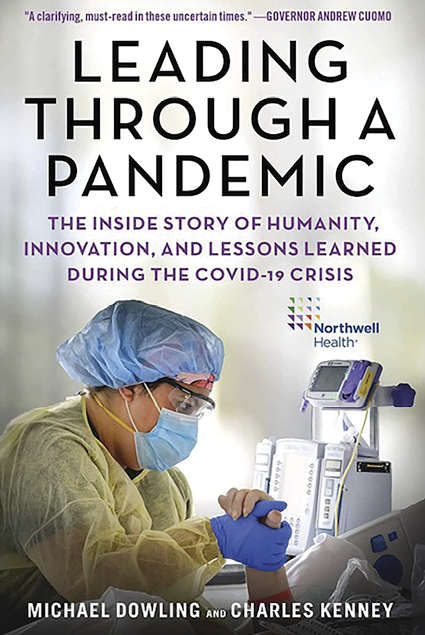
What does the phrase “Made for this” mean at Northwell Health?
It means that we have the ability and willingness to take care of every opportunity and circumstance that arises. We are optimistic and future oriented. When an issue or so-called problem occurs, the answer is always positive – that we look forward to resolving it. We always see problems as opportunities for creativity and innovation. I regularly walk the floors of our facilities to directly connect with those on the front lines. Staff, when asked about an issue, invariably respond optimistically and will say we are “Made For This.” This was extremely evident during COVID. Our culture is built on the belief that we can handle any situation and will win when we collectively decide to do so. Its teamwork.
“I regularly walk the floors of our facilities to directly connect with those on the front lines. Staff, when asked about an issue, invariably respond optimistically and will say we are ‘Made For This.’”
How has Northwell Health been able to maintain its culture as it has grown in size and scale?
This is multi-faceted but it starts with the strong belief that culture is what determines long-term success – or failure. Our culture – collaborative and team oriented, is our winning formula. We focus on making sure that we recruit well. We have an elaborate on-boarding process including my presentation to all new hires each Monday morning. At present, we are recruiting about 350 each week. We are also very careful and deliberate about who we put in leadership positions – at every level of the organization, especially first-time supervisors and middle managers. Constant communication is imperative – on vision, on strategy and on operational issues. It must be positive and inspirational. It’s about appealing to people’s heads and people’s hearts. Use technology but don’t’ overuse it. In-person meetings – like town hall meetings, where staff can directly interact, are crucial. We hold such meetings on a regular basis – and I attend. Everything is local and all must feel connected, especially in a large organization.
“I often refer to us as a mosaic – a collection of individual pieces – each with its own beauty but when put together, the whole is more beautiful. Northwell is such a mosaic.”
How do you balance having One Northwell with the need to have a local feel at each of the hospital locations?
Each entity – especially hospitals – has a particular uniqueness based on history, origin and location. It is important to preserve the positives of that uniqueness or culture while at the same time building a systemwide culture and identity so that, in our case, they all know they are part of Northwell. I often refer to us as a mosaic – a collection of individual pieces – each with its own beauty but when put together, the whole is more beautiful. Northwell is such a mosaic.
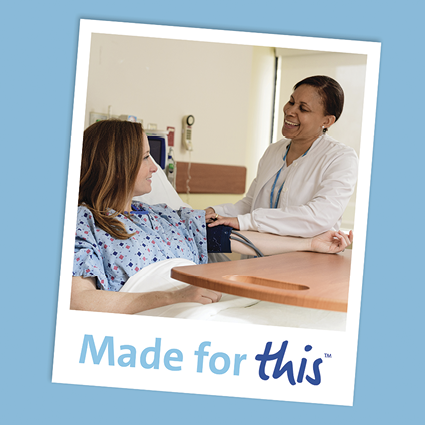
Is brand awareness important for Northwell or is it about awareness for the individual hospital brands?
Brand awareness is very important especially when you are in a competitive market like we are. Also because we are young as an organization – relative to our competition. The Northwell brand is now well known – our leadership during COVID has helped. We have to continue to enhance it and build awareness but at the same time build the recognition of some of our component entities – such as Lenox Hill Hospital, North Shore Hospital, Cohen’s Children’s Hospital and Feinstein, our renowned research entity. As we do so, we will make sure that the public knows they are all part of Northwell. It’s a complicated process but doable.
Is it challenging to differentiate a health system in the industry?
It is complicated and made more difficult by the plethora of all the ranking lists that are constantly published (a new industry). Some are legitimate and use solid metrics and some are not. We are, however, fortunate to be in New York where we have many great facilities providing great care and engaged in top-flight research and education. I am proud to say that Northwell is among them.
Looking forward, I believe the key differentiators will be a combination of clinical quality (not process but outcomes), research (new discoveries), education (preparing the workforce of the future), service (building consumer loyalty), and the promotion of prevention and wellness (going upstream).
Its also important, I believe, for healthcare organizations and their leadership to be advocate voices on key issues important to the community overall – such as sustainability and climate change and gun violence prevention and safety. They are all health related.
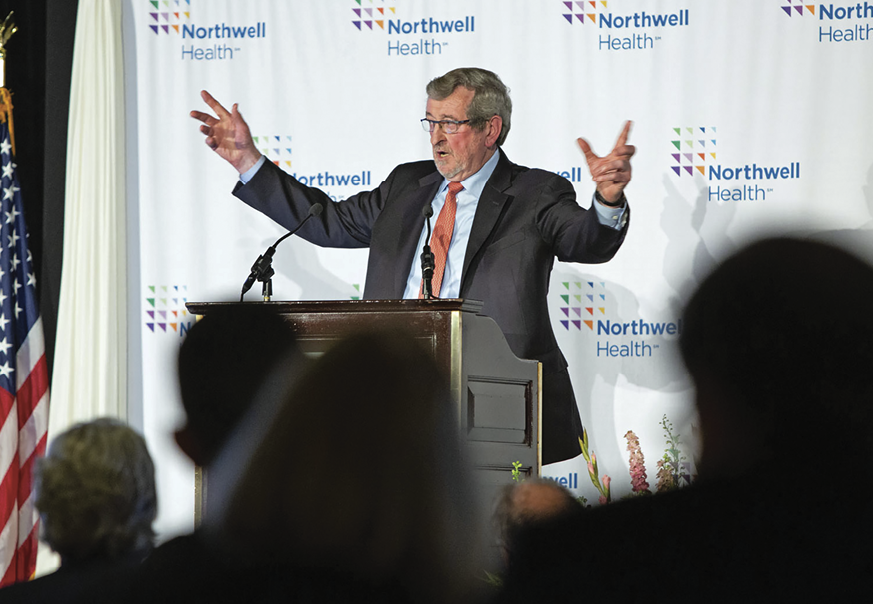
Michael Dowling speaking at the 2019 Northwell Health
annual meeting
You mentioned gun violence prevention, which is an issue that Northwell Health has taken a leadership role in addressing. What are your views on the impact of the efforts to drive change in this regard?
This is a major public health issue. There are many statistics that prove this point but one stands out – gun violence is now – in the U.S. – the leading cause of death for children and adolescents. Cancer is third. We must intensify our efforts to change this and healthcare CEOs must be in the forefront. But, while being impatient, we must take the long view – be persistent and resilient. We live in a society that is addicted to instant gratification, looking to get results very quickly, but normally that’s not how it works. We also, unfortunately, now live in a toxic political world where the art of compromise has for the most part disappeared. This impedes any quick resolution of the gun violence issue despite the recent federal legislation that passed. But I like to remind people that decades ago when Ralph Nader talked about the need to put airbags and seat belts in cars, he was regarded as crazy. Today, however, you cannot buy a car without airbags and seat belts. This shows the importance of resilience and persistence.
We need to stay optimistic about the potential for real action on gun violence prevention. Things do change over time and the more it is recognized as a public health issue, the more traction it will get.
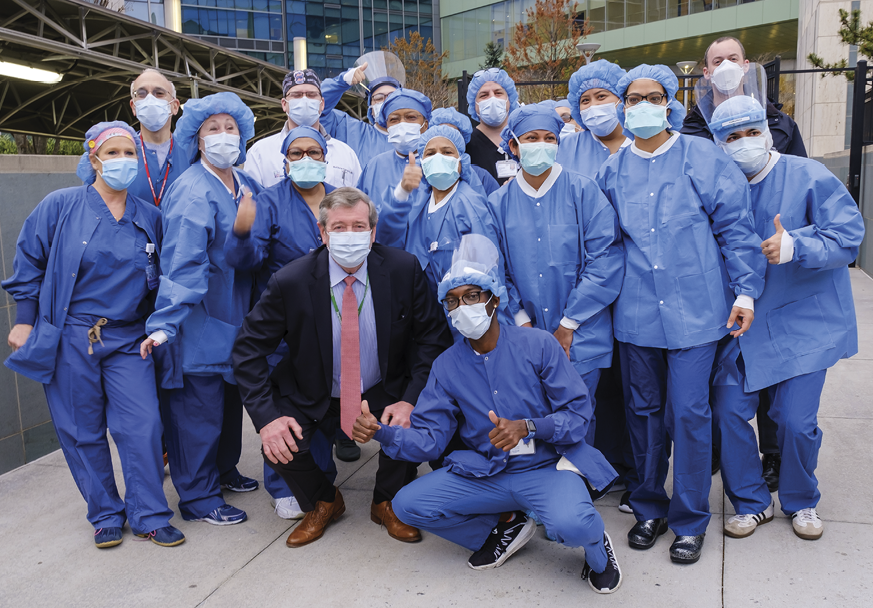
Michael Dowling with the staff of Long Island Jewish Hospital
There are many issues that have a health impact. How do you decide where Northwell focuses its efforts?
Everything has a health impact which is why it is so complex, so you have to make choices – which ones do I take a lead on and which ones can I influence – to be a catalyst. We picked gun violence because of its direct impact on all of us, but especially children – and we directly see the impact in our emergency rooms, operating rooms, mental health facilities, etc. We should be ashamed to have the worst gun violence statistics in the civilized world. We, as a country, are better than this.
“We need to stay optimistic about the potential for real action on gun violence prevention. Things do change over time and the more it is recognized as a public health issue, the more traction it will get.”
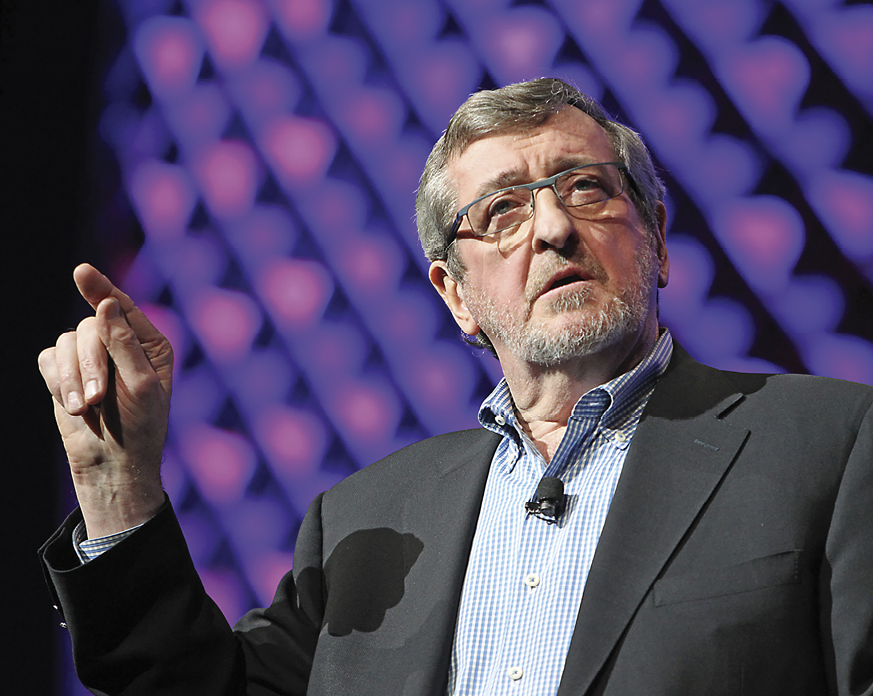
Michael Dowling speaking at an event
Will you discuss Northwell’s commitment to building a diverse and inclusive workforce?
We have a growing diverse workforce and I observe it every Monday when I present to new recruits – as I mentioned earlier about 350 each week – employees from every ethnicity, religion, culture and geography. During these meetings, I speak directly to its importance and relevance and urge each to learn more about the person who is and will be sitting and working next to them. The more you know and understand, the more inclusive and more informed you will be. We have multiple programs throughout Northwell to promote and celebrate diversity. It’s an ongoing and necessary part of our mission and operations.
We have also dramatically improved the diversity in our leadership ranks and will continue to do so.
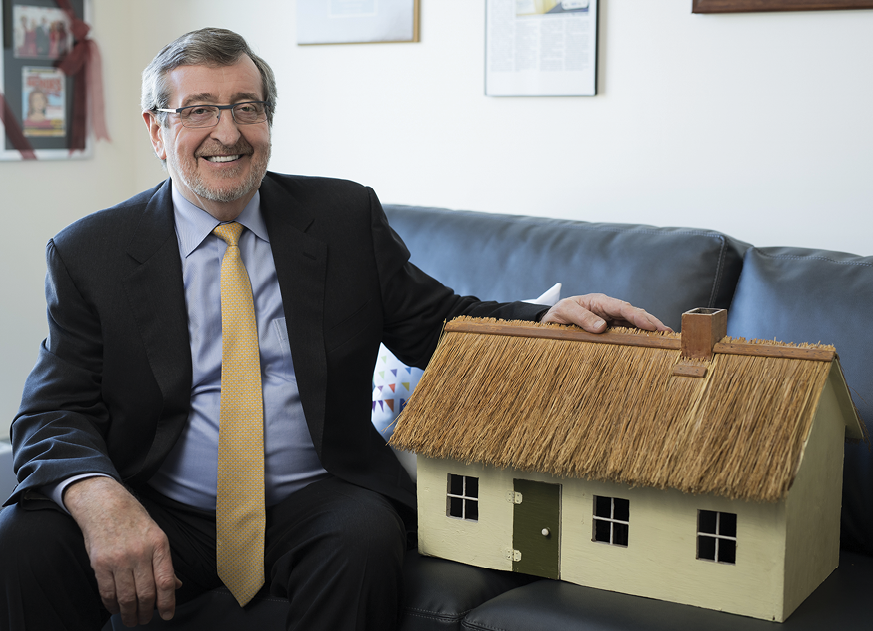
Michael Dowling with a model of his childhood home
Has the medical school at Northwell developed the way you had expected and how valuable has it been to the health system?
It has been a phenomenal success. We took some risks when we launched the school, but if you don’t take risks, you are not moving forward. It is even worse to be afraid to take risks. I was always concerned about the idea that people in medical school would only learn by sitting in the classroom, listening to lectures and reading books, and would then go into the hospital to get experience about care delivery. The problem is that hospitals are not the place where the bulk of care is delivered anymore, so while you need to have the inpatient experience, you need to have experience outside of the hospital as well. We have our students ride on the ambulances and go to people’s homes, and this allows them to understand the social determinants of health. If you go into the home of a person who is having a problem and you realize that there is no food in the refrigerator, it changes your concept of health.
The medical school is now 12 years old and we are reviewing the curriculum and looking at what the next iteration is and how we continue to change to stay ahead. This is the benefit of starting a medical school from scratch since we did not have to knock down old bureaucracies and ways of thinking. We were able to create a new culture and a new thought process.
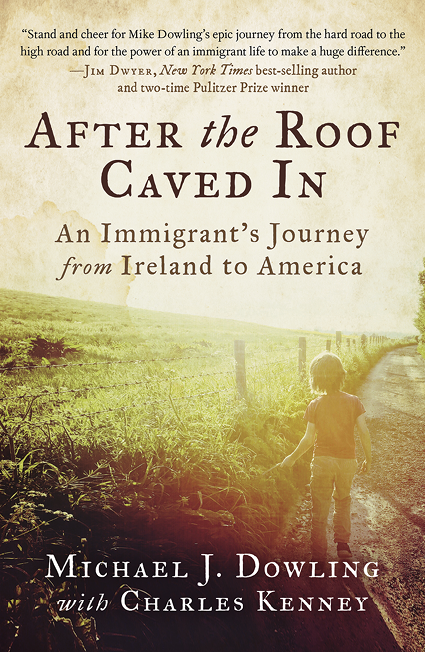
What are the characteristics that you look for when hiring talent?
First, I look for attitude – a positive, can-do, upbeat attitude. It is about someone who does not balk at challenges, but sees opportunities. Second, I look for curiosity – a person who is constantly committed to education. What you learned yesterday is outdated tomorrow. Third, I look for people who have a tolerance for discomfort, because bad things are going to happen, even in great places. It is easy to be upbeat when things are good. The real test is how you handle things when times are bad. COVID was a clear example. I tell people all the time that if you have not had a bad day, there is no way to appreciate a good day. Fourth, I look for people that want to be part of a team. It is not about you – it is about us. Lastly, you want people that are not risk adverse. You need to make mistakes to move forward.
Where did you develop your management style?
I have been away from home and on my own since I was 16 years old. This makes you learn how to deal with other people, and teaches you the importance of relationships, communication, resilience and persistence. I played sports and you can’t win a team sport without being part of the team. I have had the benefit of working in academia and in government which has been very helpful in opening me up to new experiences and different environments. I have also had the benefit of learning from all those I have worked with.
You often talk about the importance of resilience. Where did you build your resilience?
This may sound strange, but I think that poverty can be a wonderful educator and motivator. I grew up poor and it made me learn about life much quicker because I had to adapt and deal with difficult circumstances. You learn how not to quit.![]()